
Time to get back On The Buses
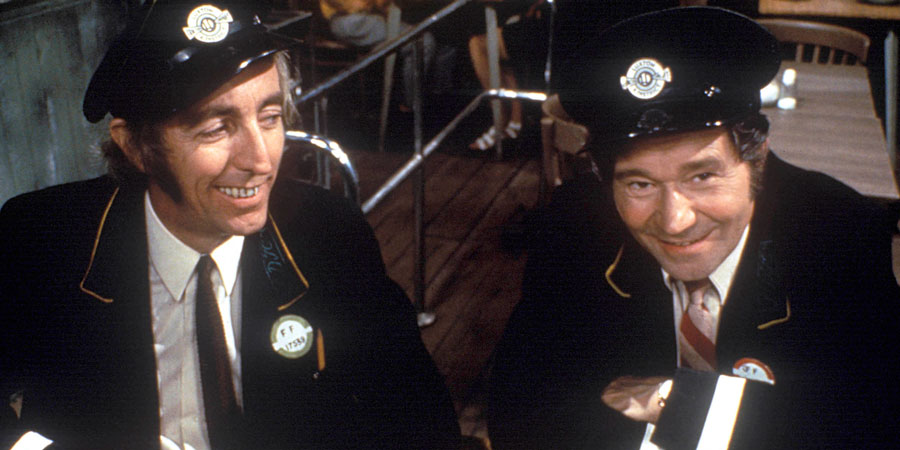
"I'll get you, Butler! I will get you! Mark my words, this time, I will get you, boy!" So fulminated wide-eyed Inspector Cyril Blake, spittle-flecked, fist clenched, to the hysterical laughter not just of his nemesis, bus driver Stan Butler and his leering, donkey-toothed conductor Jack Harper, but of hundreds in the studio audience and many millions more at home. This was On The Buses. A weekly cavalcade of sauce, insults, and "crumpet", which formed the spine of ITV's comedy schedule between 1969 and 1973. The critics always hated it, but the public loved it - and its impact, positive and negative, has been enduring. So what should we make of On The Buses now?
One of many sitcoms by prolific writing duo "The Other Two Ronnies", Ronald Wolfe and Ronald Chesney (who were also responsible for The Rag Trade and Meet The Wife, amongst others), On The Buses is almost certainly the best-known of their oeuvre, though not always for the right reasons. Castigated then as it is now for its ratings-winningly broad, coarse humour, it's easy to write the bawdy mis-adventures of Stan Butler and Jack Harper off. But we shouldn't. Like all sitcoms that embed themselves in the public consciousness, On The Buses tells us something about its time, and something about ourselves. And there are plenty of laughs to be had along the way, too.
Reginald Alfred Varney was born to be a star. A multi-talented product of music hall's last gasp - he could sing, dance and play the piano - Varney was 51 by the time he was cast as Stan. He was a natural fit, having already established himself with viewers as Reg Turner in Wolfe and Chesney's earlier hit, The Rag Trade. His boyish, jack-the-lad charms were complimented by a premium ensemble. Bob Grant, in real life a somewhat effete and gentle man, leered his way into the nation's hearts as Jack. Stephen Lewis gurned and grumbled as Blakey (or "Dracula", as the boys sometimes referred to him), whilst character actor Michael Robbins turned in a misanthropic tour de force as Arthur. It was said that Anna Karen, when not in character as Olive, was one of the most beautiful women alive. Perhaps that was overly generous, but her performance is always game; Karen more than prepared to suffer seemingly any amount of personal indignity in the pursuit of laughs. Cicely Courtneidge's transition into Doris Hare as Mum from Series 2 completed the core line-up.
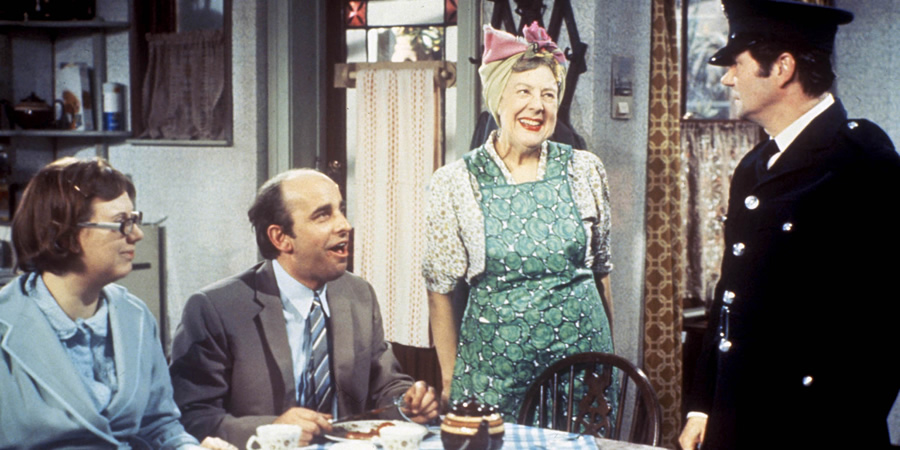
It is no surprise that the BBC turned down Wolfe and Chesney's grimy pilot script, leaving it to be snapped up by Frank Muir at LWT. This is not a "BBC show". The world of On The Buses is one of over-crowded two-up two-down houses, pie and chips, beer for the men - sometimes home-brewed - and port and lemon for the ladies. It is proudly working class. Our heroes are libidinous, yes, but they're also very political. Class, as much as sex, is a dominant engine. There is a surprising, and unusual, naturalism to the dialogue. Everyone is "mate" or "boy"; the characters speak over each other; they laugh with us at the jokes - and at Inspector Blake. We are Stan and Jack's confidantes. We see the world through their eyes.
Political topics feature heavily. In the early episode The New Inspector Stan is promoted to Inspector, intending to use his wage increase to pay for Mum's new coat. However, the power goes to his head and ruins his relationship with both Jack and his family: he is relieved to return to being a driver.
If sitcoms are about characters trapped together, then these characters are trapped not just physically, but also by class, by sex, by gender, and by self-thwarting ambition. Arthur and Olive's marriage is a surprisingly raw portrait of a relationship in decline; the first episode of Series 7, Olive's Divorce, covers the fall-out from their inevitable split.
Ultimately, this is a show that deals in truth. The archetypal episode of On The Buses pivots around the lads in pursuit of "birds", but the week-by-week plots are often more varied than that: subject matter regularly includes the fractious family, money problems, illness and there are even some more meta efforts (such as On The Omnibuses, which imagines the bus company in the 1920s, or Stan's Worst Day, which flashes back to the characters' original meeting). Whilst modern allegations of sexism do have some credence, it's important to note that Stan never gets the girl; Jack wins her occasionally - though mostly, one suspects, to provide a neat "out" when the 23 minutes are up.
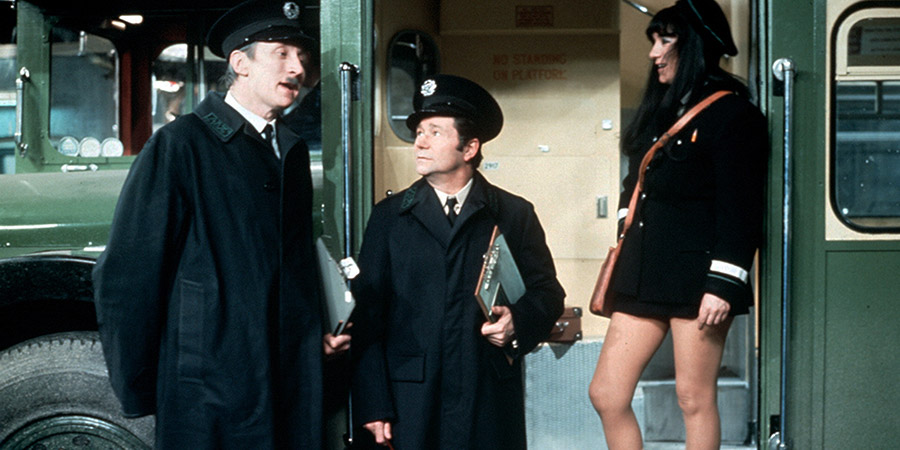
Sitcoms - particularly ITV sitcoms - of the 1960s and 70s were workmanlike affairs, the scripts knocked off in a week, then rarely tampered with. There would be some alteration in rehearsal, but nobody was too bothered if this week's was a bit thin. As such, episodes of On The Buses are as variable as episodes of any other show of the period. Hack situation comedy writers, now largely a thing of the past, sustained the wider ecology: some, trained up, moved onto greater things; others remained invaluable supports, hopping from show to show, keeping them going long after the creators had departed. Bless This House employed a large team of writers (including a young Carla Lane), an approach that worked very successfully. The Doctor series operated similarly, as did Robin's Nest, creators Brian Cooke and Johnnie Mortimer preferring to focus on their other, stratospherically popular Man About The House spin-off, George & Mildred.
On The Buses' experiment with other writers never really worked. The best of them were Bob Grant and Stephen Lewis, who perhaps had a better grasp of the series due to their starring roles in the show. Jonathan Lynn, who would later co-write Yes Minister, freely admitted that he and his then writing partner George Layton, never fully mastered the programme.
Myles Rudge, Wally Malston and Garry Chambers's contributions were equally uninspiring. Maybe On The Buses was simply running out of fuel. Maybe Wolfe and Chesney were rather greater talents than their reputation now suggests.
Certainly by Series 7, in 1973, both Michael Robbins and, more importantly, Reg Varney had had enough. Robbins didn't appear at all, and Varney left half-way through the 13-episode run, Stan having been enticed away by a better job up North. The remaining episodes are a lacklustre affair, with Blakey moving into the Butlers' house and forming an unlikely new double act with Jack. It wasn't the same, and the studio audience - so loud in the earlier episodes - is as subdued as the material.
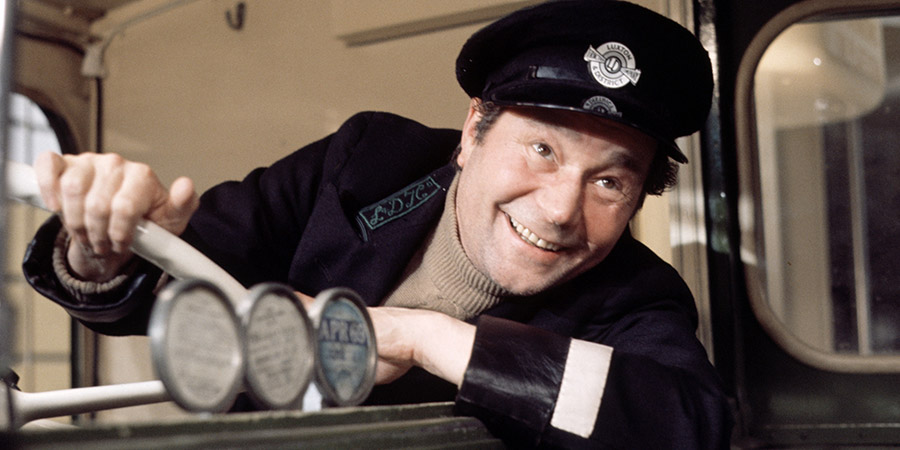
But the truth remains that On The Buses, on form, knew how to deliver. There are some genuinely great episodes, such as Canteen Trouble, which sees Blakey try to thwart Stan and Jack's over-friendly relationship with the canteen manageress, and The Squeeze, with its beautifully executed broad-as-a-barn-door physical comedy, when Stan tries to flog Blakey Arthur's motorbike. Irony can only get a series so far. Yes, some of the language may be out-dated. Of course a 50-year old man ogling a clippie half his age seems seedy and absurd. However, this was 1970, not 2020. Attitudes have changed. And On The Buses is more than just a diverting anachronism; there is great comedy and great comic performances on offer too.
In the end, we must enjoy On The Buses on its own terms. For the main cast - with the exception of Stephen Lewis, who worked consistently and achieved further fame in Last Of The Summer Wine, as well as appearing in other long-running series - it was arguably the pinnacle of their careers. Reg Varney returned to the stage, touring his song-and-dance revue, and eventually cemented his place in the history books as the first person to operate a hole-in-the-wall cash machine.
Michael Robbins enjoyed a long career as a reliable, versatile character actor; Anna Karen appeared in a number of films, not to mention EastEnders; and Doris Hare was recognised for her illustrious contribution to light entertainment with a Variety Club of Great Britain Special Award in 1982. In a tragic coda, Bob Grant never managed to rebuild a sustained career as either performer or writer following Buses' demise. He took his own life in 2003.
On The Buses is certainly ripe for spoofing, as Harry Enfield and Paul Whitehouse demonstrated with their very funny pastiches. But it remains great fun - and an example of a type of sitcom we see too little of these days: working class, down to earth, broad, recognisable, and full of jokes. Its robust reflections of the time add to its appeal. This is a show that can be enjoyed as either a social insight, or a knockabout 25 minutes - or, even, as both.
So all aboard. Last stop, Cemetery Gates. "Butler, get that bus out!"
Where to start?
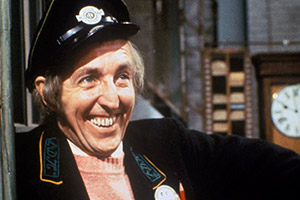
Series 5, Episode 7 - Canteen Trouble
Transmitted in 1971, at the very height of Buses' popularity, this saucy, unusually tight offering displays all the flourishes of the series that viewers loved or hated (or loved to hate). The opening gag sets the tone: Jack talks down the cost of his lunch by reminding the brassy canteen manageress of their booze up last night. "Yeah", chuckles Stan, pointing at the two perky steak and kidney puddings on his friend's plate, "I bet they remind you of last night and all."
And we're off! The plot is a simple but taught affair, written by creators Wolfe and Chesney. Discovering that the manageress has been slipping the lads extra food, whilst overcharging him for his own meagre repasts, Inspector Blake decides to bring in a new woman to run the canteen. Unfortunately, this replacement proves even more susceptible to Stan's charms - much to the cheeky bus driver's own chagrin.
This is early 70s humour on steroids. The Butlers' house piles high with food; Blakey continues to receive appalling service; and Stan is pushed into the ironic position of having to protect his own virtue during a ludicrous seduction scene. Eventually, the Inspector decides the only solution is to replace the female help with a large vending machine - but that won't stop the boys taking home a few free pies...
Want to know more about On The Buses? The programme has its own fan club: onthebusesfanclub.com
Help British comedy by becoming a BCG Supporter. Donate and join us in preserving, amplifying and investing in comedy of all forms, from the grass roots up. Advertising doesn't cover our costs, so every single donation matters and is put to good use. Thank you.
Love comedy? Find out moreOn The Buses - The Complete Series

This behemoth of a release features all 74 episodes of On The Buses; the ultimate collector's set for fans of the classic comedy!
Starring Reg Varney as jack-the-lad bus driver Stan and Stephen Lewis as the long-suffering, dim-witted Inspector Blake (Blakey) who does his best to get the buses out in time whilst making their lives as miserable as possible.
First released: Monday 13th November 2006
- Released: Monday 9th December 2024
- Distributor: Spirit Entertainment
- Region: 2
- Discs: 11
- Minutes: 1,850
- Catalogue: SPIRITV131
![]() Buy and sell old and new items
Buy and sell old and new items
Search for this product on eBay
BCG may earn commission on sales generated through the links above.
- Distributor: Network
- Region: 2
- Discs: 11
- Catalogue: 7952559
![]() Buy and sell old and new items
Buy and sell old and new items
Search for this product on eBay
BCG may earn commission on sales generated through the links above.
- Released: Monday 26th May 2008
- Distributor: Network
- Region: 2
- Discs: 11
- Catalogue: 7952842
![]() Buy and sell old and new items
Buy and sell old and new items
Search for this product on eBay
BCG may earn commission on sales generated through the links above.
- Released: Tuesday 21st November 2006
- Region: 1
- Discs: 11
- Minutes: 1,200
![]() Buy and sell old and new items
Buy and sell old and new items
Search for this product on eBay
BCG may earn commission on sales generated through the links above.

